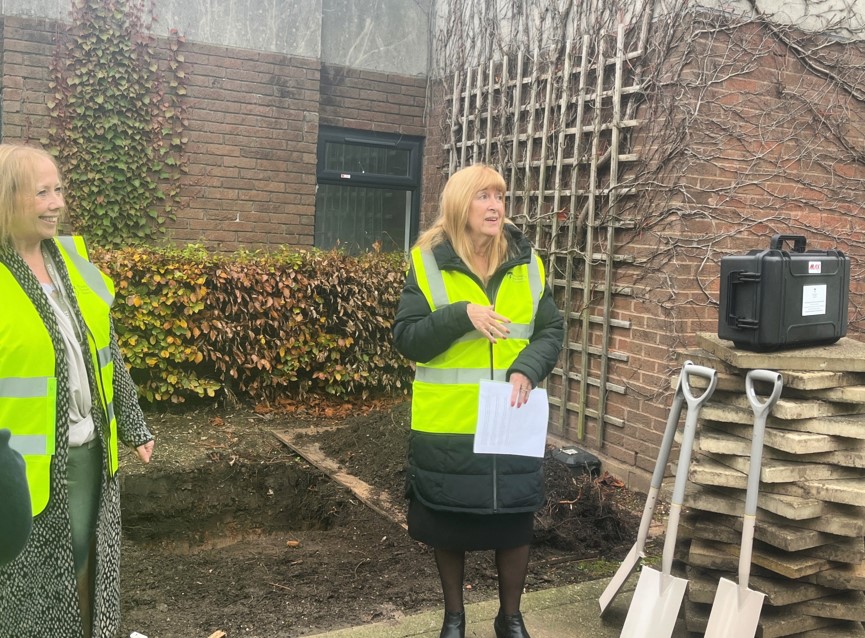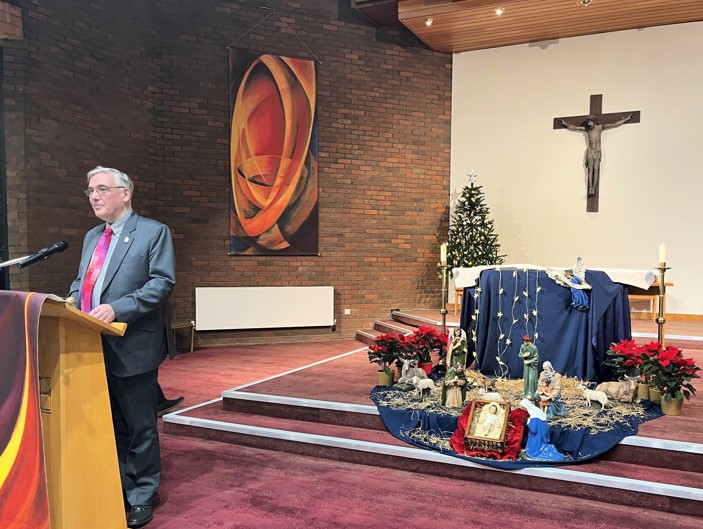
Birmingham Newman University: Becoming an Independent Council Member
Role Profile and How to Apply
Birmingham Newman University is a distinctive and increasingly successful University based in Bartley Green in South-West Birmingham.
In 2024, the National Student Survey (NSS) placed the University as number one in the West Midlands for overall full-time student satisfaction and seventh in England for overall positivity. This is coupled with the fact that we are placed in the top ten in the 2024 English Social Mobility Index.
Our students are at the heart of what we do. We give people the opportunity to improve their lives and the lives of others. This is lived out through our ever-present values rooted in our Catholic traditions, noting our namesake, Saint John Henry Newman.
With a multidisciplinary curriculum, we provide a personalised student experience and continually listen to our students to improve and shape our offer, celebrating the uniqueness that each individual brings to our community.
If you have both the time and willingness to ‘give back’ by providing your insight and experience to the strategic leadership and governance of a University like Birmingham Newman, we would love to speak to you. Please read further for additional information and details.
The University is currently looking to appoint new independent governors (trustees), who are practising Roman Catholics*, to serve on its supreme governing body, the Council, and act as directors and members of the University as a charitable company limited by guarantee.
Given the importance of the Catholic foundations of the University in informing our mission and values, eligibility for the majority of independent members of Council includes being a practising Catholic. While all current vacancies have this requirement, there are independent member positions for which this eligibility criteria does not apply.
Council members play a central role in the strategic governance of the University. As a member of the governing body, you will oversee the University’s mission to deliver high-quality education rooted in Catholic values and contribute to the fostering of a diverse and inclusive community.
Members of Council work collaboratively to determine the educational character and mission of the University, ensuring that Birmingham Newman University continues to address the needs of the West Midlands region and remain a vital part of the region’s future.
If you become a Council member now, you will join Birmingham Newman at a particularly exciting juncture in its history. The University has recently been recognised for its upward trajectory with both the Times and Sunday Times Good University Guide 2025 and the Guardian University Guide 2025 placing the University as the highest climbing institution.
Birmingham Newman has also been recognised for its significant contribution to breaking down barriers and improving opportunities for students from disadvantage backgrounds, ranking sixth nationally in the prestigious 2024 English Social Mobility Index published by the Higher Education.
Given its ambitious growth and development achieved in recent years, the University is now looking to craft our future vision and more immediate strategic goals in a way that aligns to our mission and deep rooted values – new Council members will have the opportunity to help shape Birmingham Newman’s future and that of our students.
For these vacancies, applications are encouraged from persons who are practising Roman Catholics*, from a diverse range of backgrounds regardless of age, disability, gender reassignment, marriage or civil partnership, pregnancy and maternity, race, sex, or sexual orientation and who can show a commitment to the University’s work and mission.
Council Members should be able to bring substantial external experience in education, industry, commerce, public service and/or the professions to the deliberations of the Council; we are particularly interested in hearing from anyone with experience or expertise in legal, digital and IT and/or audit and accountancy (with a view to serving on the University’s Audit and Risk Committee).
*Practising Roman Catholic: This role has been identified as having a genuine occupational requirement to be fulfilled by a practising Roman Catholic, in accordance with the provisions of the Equality Act 2010, Schedule 9, Paragraph 3, which permits such requirements for organisations with a religious ethos. For the purposes of the University’s Articles of Association, the Council’s Standing Orders (16.1) defines ‘duly qualified Roman Catholics,’ or ‘practising Roman Catholics’ as including all those in full communion with the Holy See of Rome.
The role of a governing body in a Higher Education institution today is important and significant. The Higher Education and Research Act (2017) enshrines the governing body’s responsibility in law.
As outlined in the University’s Articles of Association, Council is collectively responsible for:
- The determination of the education character and mission of the University and for overseeing its activities
- The effective and efficient use of resources, the solvency of the University and for safeguarding its assets
- Approving the annual estimates of income and expenditure
- The appointment, grading, suspension, dismissal and determination of the holders of Senior Posts; and
- Setting a framework for the pay and conditions of service of all other staff.
Council Members have a duty to observe the highest standards of corporate governance which includes ensuring and demonstrating integrity and objectivity in the transaction of business and, wherever possible, following a policy of openness and transparency in the dissemination of their decisions.
All members of the University’s Council must be considered ‘fit and proper persons (PDF – 95.8KB)‘ as defined by the Office for Students, and it is important that those involved as Members of Council observe the Nolan Principles of Public Life.
The initial term of office for members of Council is typically three years with members being eligible for appointment to further terms of office up to a total of nine years.
While Council members will be invited to join in the University’s community life where they are able to do so, it is expected that at minimum members engage in the four formal meetings and two strategy days of the Council held annually, an annual joint Council and Senate meeting, as well as approximately four meetings of one Council Sub-Committee.
The role of a Member offers significant career/personal development opportunities and the prospect of making a major contribution to the leadership of a dynamic and mission driven educational organisation.
If you are interested in becoming a Member of Council, and in playing an important role during this exciting period of the University’s history, then we encourage you to contact the University Secretary Yvonne Salter Wright in the first instance to discuss the role and answer any questions you might have. To do so, please email y.salter.wright@staff.newman.ac.uk and a telephone or video call can be arranged.
To apply, please submit a short curriculum vitae and complete a brief application form, describing why you would like to serve in this capacity and outlining how your expertise, skills and experience could support the work of the Council.
Please submit your application to council@newman.ac.uk. All applicants who meet the eligibility criteria based on their application will be invited to a discussion with a Panel that will include members of the University Council (including its Chair), the Vice-Chancellor and University Secretary.
While there is no deadline for submission of applications as there are a small number of upcoming vacancies, we would encourage expressions of interest be sent to Yvonne with a view to applications being submitted prior to Sunday 27 April 2025.
Application Documents
For further information on the University’s activities and its governance, please visit the following:
- Overview of the Size and Shape of the University: We have created a brief summary of key statistics and information about Birmingham Newman University: Key Fact Sheet (PDF – 61KB).
- Learn more about the University Council: Discover the structure, role, and current membership of the governing body overseeing the University. See here: University Council Webpage.
- Examine Council’s Primary Responsibilities: understand the University’s Council’s key duties and accountabilities within the University. See here: Statement of Primary Responsibilities (found within Standing Orders of the University Council (PDF – 270KB))
- Explore the Articles of Association: Gain insight into the foundational legal framework that governs the University. See here: Birmingham Newman University: Articles of Association
- Review the University’s Current Strategic Framework for 2020-2025: sets out the University’s current vision, mission, and priorities through to 2025, noting the University is currently developing its new vision and strategy. See: Strategic Framework 2020 – 2025
- Learn more about what expenses can be claimed by Council members: The Gifts and Hospitality Policy includes the rules Council members follow when claiming for legitimate expenses incurred when attending Council-related meetings or events.
- Check the Council meeting dates for 2024-25: Stay informed about upcoming meetings for the 2024-25 academic year. See here: University Council Meeting Dates 2024-25
- Campus Video Tour: take a virtual tour around Birmingham Newman University’s campus and its facilities.
How many meetings will I attend?
Council meets for scheduled business four times a year with the addition of two Council strategy days. Council members are appointed to the membership of one of its four key sub-committees will attend between three to four scheduled meetings of that sub-commitee a year.
Additionally, there is a joint meeting of the Council and Senate which typically takes place in the Autumn Term. Before each meeting there will be approximately a half day in preparation, with the agenda and papers normally circulated to members no later than one working week before the meeting.
Are there specific eligibility requirements for Council members?
Yes. For certain roles, such as the Chair, individuals must be practising Roman Catholics. Independent members should demonstrate a commitment to the values and mission of the University.
Are Council members compensated for their service?
Membership is a voluntary role. However, as per the University’s Expenses Policy, members can claim reimbursement for reasonable travel expenses and are provided with hospitality during meetings.
What support is available for new Council members?
New members receive an induction programme to familiarise them with their roles and responsibilities. Ongoing briefing, training and development opportunities such as attendance at relevant conferences are also offered.
What happens if a member has a conflict of interest?
As per the Committee of University Chairs Higher Education Code of Governance (3.2), members of governing boards need to act, and be perceived to act, impartially. The University therefore maintains a register of interests of executive and non-executive members, which is reviewed on a regular basis.
Members must declare any personal interests, or the interests of close family relationships, that may affect their impartiality. Should discussions and decisions on such matters arise then members are expected to withdraw for the duration.
For more guidance on declaring interests, you can review the Guidance note here, or contact the Yvonne Salter Wright, University Secretary (y.salter.wright@staff.newman.ac.uk).
What committees does Council operate?
The Council has four key committees, including:
- Finance and General Purposes Committee (FGPC);
- Audit and Risk Committee (ARC);
- Nominations and Governance Committee (NGC);
- and Remuneration Committee (RemCo).
These committees focus on specific aspects of the work of Council as set out in the Council’s Standing Orders and report to the full Council. Independent Members are expected typically to serve on one of the above sub-committees.
The Council may also on occasion establish sub-groups to inform or progress a particular programme of work on its behalf, for instance there is currently a Strategy Development Sub-Group and a Governance Effectiveness Review Steering Sub-Group.
Who leads the Council?
Council has both a Chair and a Vice-Chair. The Chair is responsible for the leadership of the University Council and plays an important role in efficient operation of Council in the fulfilment of its responsibilities, as outlined in the Articles of Association and Standing Orders. As part of the role, the Chair ensures that members of Council work together effectively, observe the principles of public life, and ensures that members are properly supported and receive appropriate inductions, advice, encouragement, and formal and informal training.
The Vice-Chair plays an important role in providing additional resilience to the role of Chair, taking up the duties of the Chair should the latter be absent for a prolonged period of time.
After completion of an extended first term of office, the Chair, Professor Emeritus Margaret House, is stepping down and the Council has elected a new Chair, Professor Martin Stringer, with effect from 1 April 2025.
What does being a practising Roman Catholic mean in this context?
This refers to individuals in full communion with the Holy See of Rome, as outlined in the University’s Articles of Association. If you have questions about this, do please contact Yvonne Salter Wright, University Secretary (y.salter.wright@staff.newman.ac.uk).



